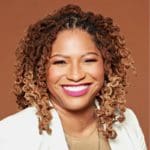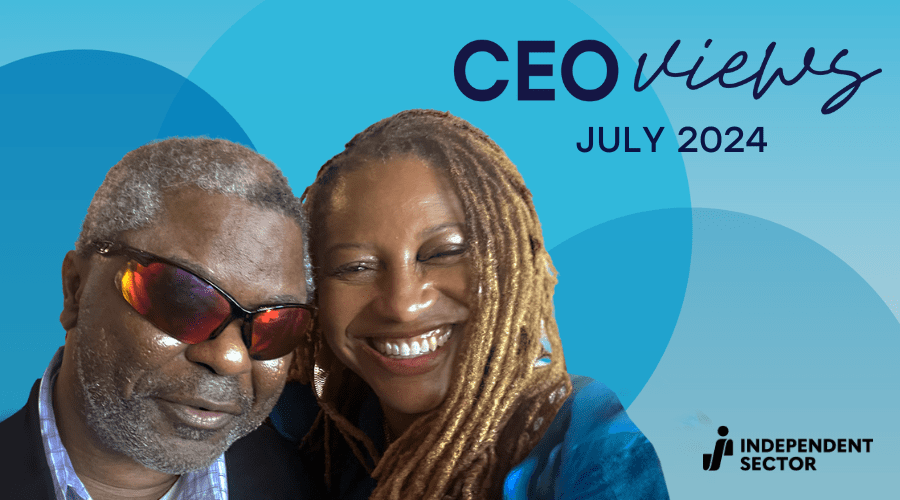As July ends, I’m reflecting on the significance of Disability Pride Month, which has deep personal meaning for me. All my life, I’ve known firsthand the unique contributions and perspectives of folks in my family who are Black, disabled, and wanted to achieve their full potential.
Please allow me to have a personal moment. I come from a family where many of my aunts and uncles are blind; some are both blind and deaf, as well as Black and rural. Growing up, my family taught me that people with disabilities can achieve the same goals I wanted for myself — go to college, obtain a good and fulfilling job, get married, and buy a home.

Dr. Akilah Watkins with her Uncle, Leroy Harkley
Take my Uncle Leroy Harkley, for example, who was born partially blind. He became fully blind after a botched surgery in the segregated South as a little boy. Uncle Leroy was one of the first people in our family to go to college. After graduating from the University of North Carolina at Charlotte, he traveled the country, worked for the Internal Revenue Service for 20 years, and bought a home in Atlanta. I helped Uncle Leroy and his wife buy their home; then I fell in love with the city and stayed. Atlanta is where I began my career in philanthropy as a program officer at 24 years old.
People with both visible and invisible disabilities are an integral part of our families and our society. We must be intentional about creating space for them to participate fully in our communities and civic life. Are there accessible voting options? Are volunteer opportunities inclusive? Do employment practices support workers with disabilities?
Growing up, we always made sure my Uncle Leroy and my Aunt Sherry — who was both legally blind and deaf — could be part of our family gatherings. This same mindset is also crucial when we consider disability inclusion in the charitable sector. When evaluating our organizations and programs, we must ask: are we making our work inclusive of people with disabilities?
More than 12.5 million people work in the U.S. nonprofit sector. We estimate that more than 1 million of these nonprofit workers have a disability, and yet far too often they are not fully represented and supported in our sector.
How often does our sector talk about — and address — ableism in our organizations? How often do we explicitly discuss the barriers workers with disabilities face in securing employment and advancing within nonprofits and philanthropy? How are we centering the voices of people with disabilities and ensuring they have a seat at the table?

Dr. Akilah Watkins
Research from IS member Candid shows that nonprofit workers with disabilities may be underrepresented across our sector, and only 3% of the country’s largest nonprofits are led by CEOs with a disability. We also know that the data we have are limited, and more research on disability in the nonprofit workforce is needed. This is why disability is a factor we’re examining in our research on financial insecurity in the nonprofit workforce, coming this fall in partnership with United for ALICE.
At Independent Sector, we’re working on tax policy that will allow nonprofits to receive a tax credit for making their organizations more accessible for people with disabilities.
A small business can get a tax credit of up to $5,000 each year for the cost of complying with the Americans with Disabilities Act (ADA), including expenses to remove physical barriers and provide audio- or visual-assistance materials. A small nonprofit, however, can’t claim that very same tax credit. These credits were designed as income tax credits, so — even though nonprofits pay billions of dollars in payroll tax every year — nonprofits aren’t eligible.
As organizations whose missions depend on serving the public, nonprofits have a special responsibility to be accessible to all. For organizations that occupy older buildings, or for those with ongoing accessibility costs for their audiences, the cost of ADA compliance can be significant. That’s why Independent Sector is advocating for nonprofit organizations to be allowed to claim the Disabled Access Credit and other tax credits available to for-profit employers.
Independent Sector members across the country are advocating for disability rights and advancing innovative programming. American Council of the Blind and VisionServe Alliance are national membership organizations that advocate for Americans who are blind or have low vision. Guide Dog Foundation and Blue Path Service Dogs provide guide and service dogs to individuals who are blind and children with autism, respectively, increasing opportunities for independence.
Other Independent Sector members are making significant strides in supporting diverse communities. Deaf Action Center operates programs to advocate for and serve deaf and hard of hearing individuals in North Texas. The National Multiple Sclerosis Society funds cutting-edge research, drives change through advocacy, and provides programs to people affected by MS. The Policy Center for Maternal Mental Health works to close gaps in maternal mental health care by advancing research and policy solutions. And, under Darren Walker’s leadership, the Ford Foundation made an explicit commitment to promote the rights and priorities of people with disabilities around the world.
During Disability Pride Month — and all year long — I’m asking changemakers like you to commit to disability inclusion in your organization’s work. As Angela Glover Blackwell, founder of IS member PolicyLink, reminds us, when the walls of exclusion come down, everybody gains.
What other organizations in the nonprofit and philanthropic sector are leading work on disability rights? Let me know at akilahw@independen1stg.wpengine.com.
Dr. Akilah Watkins is president and CEO of Independent Sector.



